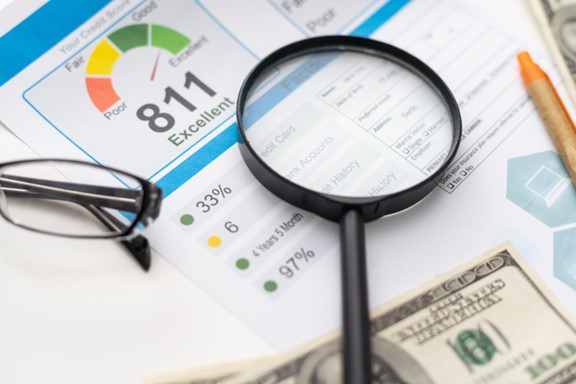Published July 12, 2024 • 6 Min Read
TLDR
-
As the cost of living remains high across the country, Canadians are increasingly turning to their credit cards to cover expenses
-
But credit cards should be used wisely, and it’s important to maintain a healthy credit score — especially during challenging times
-
Here’s a step-by-step guide to use your credit card wisely and help ensure a financial rough patch is only temporary
As Canadians face a higher cost of living, more and more rely on credit to get by. In fact, TransUnion, one of the major credit reporting agencies in Canada, recently reported that the average credit card balance for Canadian consumers increased 9.4 per cent over last year. The report indicates that consumers’ incomes are earmarked to cover higher mortgage payments and pay for everyday goods that cost more than they used to.
Are you facing challenging financial times? If you’re like many Canadians, you’re juggling credit card balances, loans, mortgages and other financial obligations. Here are steps to help keep up with your payments and preserve your credit score.
What is a credit score?
A credit score — also known as a credit rating — is a number that reflects how well you have borrowed and repaid money. The number is assigned by a credit bureau, which uses your credit history — facts gathered from financial institutions, retailers and lenders about how well you have handled credit in the past — to determine your score. Most of this information stays in your credit file for seven years, but your score may go up or down based on how you manage credit on an ongoing basis.
What is considered a good credit score in Canada?
Credit scores typically range from 300 – 900. While credit models vary, scores between 660 and 724 are generally considered “good.” Scores 725 – 759 are considered very good, while scores over 760 are considered excellent.
Why is it important to have a good credit score?
A good credit score positively affects many areas of your financial life. For instance, lenders will use your credit score to assess your risk when deciding whether to lend you money — and, if so, how much and at what interest rate. In other words, a strong score can mean you’re eligible to borrow more money at lower rates. This, in turn, can translate to an easier path to getting a mortgage, buying a car, qualifying for certain credit cards and more.
What’s more, telecommunications companies, insurers, building owners and government agencies also use your credit score to assess risk. If you have a bad score, you may not get access to some of these services.
How to maintain your credit score while under financial pressure
While it’s one thing to understand what a good credit score is and why it’s essential, it’s another to maintain one during challenging financial times. After all, credit may be seen as a safety net, as 31.8 million Canadians have one or more credit cards, and the number of Canadians carrying a balance continues to increase. While using credit might be unavoidable for some, knowing how to use it — and what actions affect your credit score — can help you maintain a good score.
What lowers a credit score?
When credit bureaus gather data to establish your credit score, there are several things they look at. Here are some of the factors that will negatively affect your score.
Paying bills late
While paying one bill a couple of days late might not cause your credit score to change, regularly missing due dates on your bills may have a meaningful impact. Letting bills fall to collection agencies may even have a more significant effect on your credit score.
Nudging close to your credit limit
Your credit utilization, the percentage of the borrowing limit you’re using on your credit cards or other revolving credit accounts, also plays a vital role in determining your credit score. If you’re using more than 30 per cent of your limit on your credit accounts, your score may dip. Credit bureaus look at individual credit accounts and the total of all your accounts when calculating your credit utilization.
Opening new credit accounts
Taking on new debt may increase your chances of falling behind on old debts. A “hard inquiry,” when a lender processes a credit application for you, is recorded in your credit history. This may negatively affect your credit score.
If you open a new account and everything else in your credit report is positive, the effect may only last for a while, and your score may rebound within a few months.
How to keep — or rebuild — a good credit score
As you might expect, paying your bills on time and keeping your credit utilization below 30 per cent will help maintain or rebuild a good credit score. But what if this is hard to do? If you’re feeling a credit crunch, here’s how you can help keep a good score.
Don’t try to solve the problem with more credit
Opening new credit accounts will be reflected on your credit history and can negatively affect your score.
Talk to your lenders
If you can’t make a payment, instead of missing it altogether, reach out to your lenders to try to arrange a payment plan that can help preserve your credit score.
Avoid switching to cash-only
Some people believe avoiding credit can help improve their credit score and will switch to using their debit card or cash to pay for items. While this behaviour may keep credit balances down, credit bureaus look favourably at your ability to use and repay credit, so using a credit card and paying down the balance can help keep your score up.
Make at least your minimum payments
If you can’t pay off your credit bills, make at least the minimum payment outlined in your statement. While you may not be making a dent in your debt, you’re meeting your obligations, which works in your favour.
Read a complete list of tips to keep your credit score in good standing. If your credit score has taken a hit, here are steps to rebuild your credit score and financial confidence.
Know where you stand
Like with most things, the more you know, the better you may deal with a situation. By checking your credit score, you can see where you stand and take the necessary steps to improve or maintain your score. It’s easy to check your credit score online, and it’s worth taking a look once a year to ensure your score is aligned with your expectations.
Remember, by maintaining a solid score today, you’ll be in a better financial position tomorrow. As economic pressures ease, you’ll be better prepared to reach money and life goals that truly matter to you.
This article is intended as general information only and is not to be relied upon as constituting legal, financial or other professional advice. A professional advisor should be consulted regarding your specific situation. Information presented is believed to be factual and up-to-date but we do not guarantee its accuracy and it should not be regarded as a complete analysis of the subjects discussed. All expressions of opinion reflect the judgment of the authors as of the date of publication and are subject to change. No endorsement of any third parties or their advice, opinions, information, products or services is expressly given or implied by Royal Bank of Canada or any of its affiliates.
Share This Article






